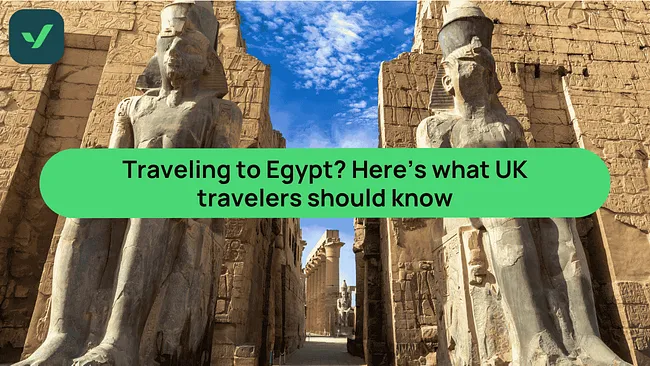
Egypt
Welcome to Egypt
Traveling to Egypt? You may need a visa – find out if you do and which type, so you can get the paperwork out of the way and focus on your trip.

What’s an Egypt eVisa and who’s it for?
Who’s the Egypt eVisa for?
The Egypt Visa opens doors for travelers from over 70 countries, including the European Union, the United Kingdom, and the United States. Check your eligibility here and apply instantly online!
Who isn't eligible for the Egypt eVisa?
- US, EU, and UK travelers visiting the Sinai Red Sea resorts like Sharm El Sheikh, Dahab, Nuweiba, or Taba, won't need a visa for up to 14 days. You'll get a free entry permission stamp instead.
Note that if you want to explore beyond these resorts, you'll still need to secure a visa before you arrive in Egypt.
- Travelers from Bahrain, Hong Kong, Israel, Kuwait, Lebanon, Macao, Oman, Saudi Arabia, the United Arab Emirates, and Malaysia.
What’s the purpose of an Egypt eVisa?
Tourism, business, or medical visit purposes.
How long can you stay with an Egypt eVisa?
We offer two types of Egypt eVisas:
-
Single-entry visa: With this option, you can enter Egypt once and stay for up to 30 days.
-
Multiple-entry visa: This option lets you make multiple trips to Egypt and stay up to 30 days per entry. The validity can vary depending on your application details – from three months to a year.
What are Egypt's long-term visa options?

Zimbabwe offers a variety of long-term visa options catering to different needs. Here are some of the more common options:
-
Student visa: Intended for individuals who wish to study at Egyptian educational institutions. This visa requires proof of enrollment and other academic documents.
-
Work visa: For those who are planning to work in Egypt. This visa typically requires a job offer from an Egyptian company and other work-related documents.
At iVisa, we currently don’t offer these visas, but you can find out more from the nearest Egyptian embassy or consulate.
Staying healthy in Egypt: Here’s what you need to know
Egypt boasts a high standard of medical facilities and healthcare services. Here's what travelers should know.
Make sure to stay updated on routine vaccines
-
Travelers aged 9 months or older coming from countries with a yellow fever risk must show proof of vaccination upon arrival.
-
Common recommendations include Hepatitis A, Hepatitis B, and typhoid.
-
Stay informed about Egypt's COVID-19 requirements, such as quarantine, testing, or vaccine certificates, through your airline or the Egypt Ministry of Health and Population website.
Medical facilities
-
In major cities like Cairo and Alexandria, you can find private hospitals and clinics that offer high-quality medical care.
-
In more remote areas, healthcare facilities may be less advanced and harder to access.
-
Pharmacies are widely available in urban areas.
Health insurance
We always recommend taking out health insurance before you travel.
Contact your insurance provider before traveling to ensure you have the right level of coverage.
Try and get a policy that covers:
-
Trip cancellation, delay, and interruption benefits.
-
Medical expenses and medical evacuation benefits.
-
Lost baggage coverage.
Things to be aware of when visiting Egypt
Keep an extra eye on the following to keep healthy and safe during your trip to Egypt:
1. Heat exposure: Egypt can be extremely hot and dry. It's essential to stay hydrated, use sun protection, and wear appropriate clothing.
2. Food and water: It's advisable to drink bottled or purified water and be cautious with street food, opting for well-cooked meals from reputable sources.
3. Animals: There is a risk of rabies from dogs and other animal bites. Avoid contact with stray animals and consider a rabies vaccine if traveling to remote areas.
Medication for personal use
Follow these guidelines when bringing medication into Egypt:
-
Declare all medications: Report all medication for personal use to customs authorities.
-
Original packaging: Always keep medicines in their original containers and in transparent bags in your hand luggage.
-
Prescription or doctor's letter: Present the medical prescription issued by your doctor or other competent authority in English.
-
Check for restrictions: Before you travel, you can contact the nearest Egyptian embassy or consulate to verify that all of your prescription(s) are legal to bring with you.
-
Pack only what you need: Bring only a reasonable quantity that aligns with the duration of your stay to avoid complications.


 Australia ETA Online
Australia ETA Online
 United Kingdom ETA
United Kingdom ETA
 India Tourist eVisa
India Tourist eVisa
 Canada ETA Visa
Canada ETA Visa
 Turkey eVisa
Turkey eVisa
 Egypt eVisa
Egypt eVisa
 Singapore SG Arrival Card
Singapore SG Arrival Card
 Indonesia eVoa Visa
Indonesia eVoa Visa
 Aruba ED Card
Aruba ED Card


